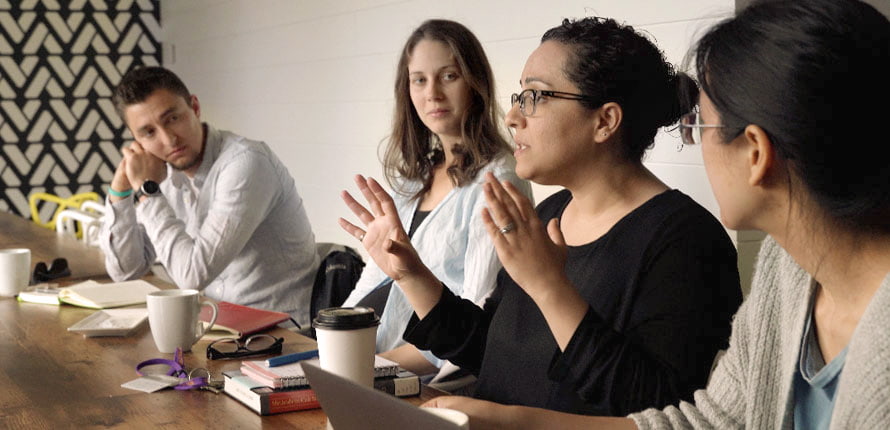Search for academic programs, residence, tours and events and more.
Our Master of Arts (MA) in History program is part of the Tri-University Graduate Program in History, a partnership of Laurier, the University of Waterloo and the University of Guelph.
The integration of history departments makes this program one of the biggest graduate history programs in Canada, while retaining the small classes and supportive professor-student relationship associated with History at Laurier.
Full-time masters students in history are eligible for funding, comprised of internal and external scholarships, and GTAships.

Small classes: 15 students or fewer.
Funding and teaching opportunities available.
Wide range of courses over three campuses.
We are deeply committed to teaching and to your scholarly development. You’ll take part in great discussions with faculty and your colleagues in seminars designed for MA students only. The classes you will attend will never have more than 15 students.
You’ll receive personal attention from active researchers. The close student-professor relationship is important to us. Our dedicated faculty can support you in the widest possible range of research interests and can help you fulfil your academic and professional objectives.
Although you’ll have the attention of one department, you’ll have access to the resources of three of the largest graduate history programs in the country. This means you’ll benefit from:
This is a 12-month program and you have three program options of study:
Our faculty supervise master's research ranging from ancient times through the modern era, covering the world from North America and Europe through the Middle East, Africa and Asia.
The department has particular strength in gender history, cultural history, peace and conflict studies (the department is closely linked to the Laurier Centre for the Study of Canada), and the history of globalization.
"Faculty with a diverse range of interests introduced me to new topics and new ways of thinking. Through hashing over difficult issues within small group seminars, I improved my ability to think critically and to put my ideas into words."
Nathan Alexander (MA '10)
Take the first step in your graduate education and apply to one of our graduate programs. Follow our three-step admission process — we’ll walk you through how to apply and prepare for your first day as a graduate student.
After you have submitted your OUAC application, paid the non-refundable application fee, and Laurier has received your application, you'll receive an email from gradadmissions@wlu.ca advising you to upload the additional required documentation to Laurier’s Online Registration and Information System (LORIS).
Please note, the application process and the uploading of supplemental documentation, which includes references, typically takes two weeks. To avoid disappointment, apply early.
An application for admission to our MA program in History must include:
Visit our Graduate Admissions Toolkit for more information about applying.
Proficiency in written and spoken English is essential to graduate studies at Laurier. Applicants whose language of instruction during their previous postsecondary education was not in English must submit evidence of proficiency in English. If applicable, results from accepted testing services must be uploaded to LORIS.
Questions? Contact Susan Neylan, graduate coordinator, at sneylan@wlu.ca or 548.889.5058. For general inquiries, contact Erin Campana, office administration coordinator, at history@wlu.ca or 548.889.3717.
"I wasn’t expecting to be able to have a wide selection of grad studies seminars to take. It was fantastic to be able to take classes at U Waterloo and U Guelph seamlessly."
Maddy Aucoin (MA '19)
Regardless of the type of graduate degree program you intend to pursue, financial planning is important. At Laurier, we want to provide you with as much information as possible about a variety of scholarship and funding opportunities and equip you with the skills to manage your finances effectively in the years to come.

Graduates of our program have successful careers in higher education, teaching, government, libraries and archives, and the private sector.
ASPIRE is Laurier's professional skills development training program for graduate students. The program helps you craft an individualized, extracurricular learning plan tailored to your professional journey and entry to the workplace.
Learn about the interests of our faculty members. For assistance in identifying an appropriate supervisor, contact a member of our team.
Gavin Brockett
Associate Professor
Coordinator, Muslim Studies Option
Vice-Dean of Arts
Tarah Brookfield
Professor
Blaine Chiasson
Associate Professor
Adam Crerar
Associate Professor
Darryl Dee
Associate Professor
Jeff Grischow
Professor
Associate Director, Tshepo Institute for the Study of Contemporary Africa
Mark Humphries
Professor
Rob Kristofferson
Professor
Sofie Lachapelle
Professor
Dean of Arts
Lianne Leddy
Associate Professor
Amy Milne-Smith
Professor
Darren Mulloy
Professor
Susan Neylan
Professor
Graduate Officer
Chris Nighman
Professor
Eva Plach
Professor
Chair, Department of History
David Smith
Associate Professor
Kevin Spooner
Professor, North American Studies
Director, Laurier Centre for the Study of Canada
Dana Weiner
Associate Professor